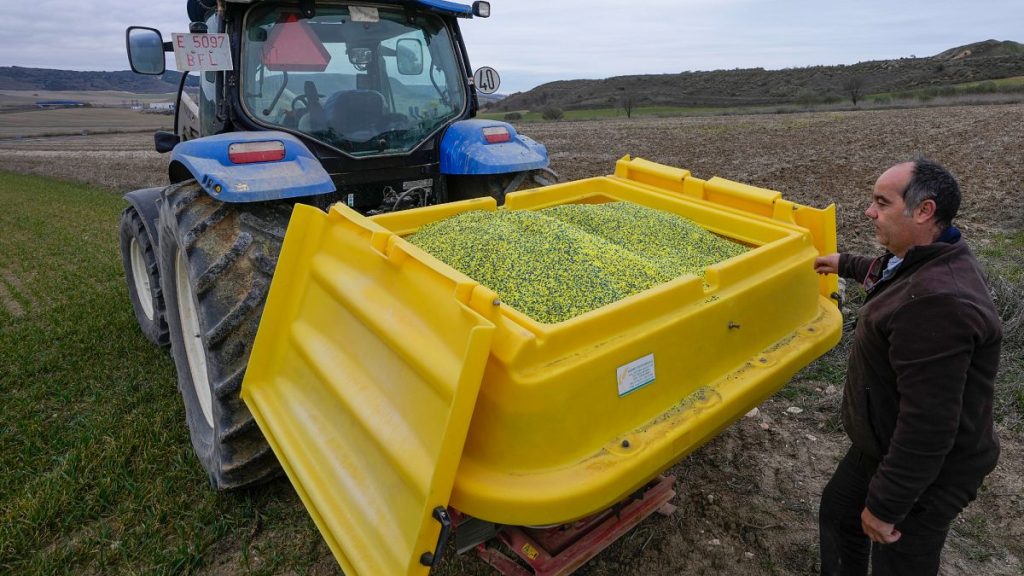The European Commission is proposing new customs duties on Russian fertilizer imports, a critical issue for the EU’s agricultural sector, which heavily relies on these fertilizers. Currently, Russia supplies approximately 25% of the EU’s fertilizer imports, putting European farmers in a precarious position as they could face significant cost increases. As the EU grapples with food security concerns and the impact of ongoing sanctions against Russia, stakeholders are calling for careful consideration of the potential repercussions on agricultural production and costs.
| Article Subheadings |
|---|
| 1) Concerns Over Dependence on Russian Fertilizers |
| 2) The European Parliament’s Position |
| 3) Implications for Domestic Fertilizer Production |
| 4) Member States’ Reactions and the Path Forward |
| 5) Summary of the Situation and Future Outlook |
Concerns Over Dependence on Russian Fertilizers
The agricultural community in the European Union is voicing significant concerns regarding its reliance on Russian fertilizers, which account for around 25% of imports. This dependence creates a vulnerable situation for the EU’s farming sector, as increased customs duties would likely lead to higher costs for farmers. Dominique Dejonckheere, energy policy adviser at Copa-Cogeca, highlighted the repercussions of increased fertilizer costs, stating,
“Increased demand will generate more pressure in terms of logistics, and therefore higher costs. These cost increases will generate agricultural inflation…”
As fertilizer expenditures make up a considerable portion of farmers’ variable costs, any increase could severely impact their income and overall competitiveness in the market.
The European Parliament’s Position
Inside the European Parliament, Inese Vaidere, a Member of the European Parliament (MEP) from the European People’s Party (EPP) has called for a balanced approach to the proposed customs duties. She acknowledges the diverse interests involved and emphasizes that while no single party may be completely satisfied with the outcome, the proposal is necessary to strengthen European food security.
“Russia has managed to produce fertilisers from cheap Russian gas… If we buy these Russian fertilisers, we continue to feed the Russian war machine,”
she stated, explaining the urgent need for Europe to reconsider its fertilization strategies. Vaidere warned that if the proposal were delayed further, Europe might continue to support Russia indirectly.
Implications for Domestic Fertilizer Production
The European Commission maintains that the proposal to impose additional customs duties will facilitate an uptick in domestic fertilizer production and thus strengthen local industries. The Commission argues that the current energy crisis and sanctions against Russia necessitate a shift towards producing fertilizers within the EU. However, Dejonckheere cautions that significant hurdles remain, particularly regarding the affordability of fertilizers.
“We need fertilisers at affordable prices… energy costs are too high,”
he stated. The Commission is not only urging for increased domestic production but also proposes diversifying supply sources to reduce reliance on Russian imports. This strategy aims to safeguard agricultural production and ensure stable prices for farmers.
Member States’ Reactions and the Path Forward
EU member states have largely expressed their support for the initiative, with the notable exception of Hungary. Most are keen to progress with the proposed duties while remaining cautious about the potential economic impact. An absence of a thorough impact study has led to demands for regular monitoring of the evolving situation. Some members are concerned that a lack of visibility and predictability could disrupt agricultural production across the continent, leading to broader implications for food security. The formal discussion on this issue is set to take place at the start of the following month, where MEPs will aim to harmonize their position with that of the member states to finalize a joint text concerning the proposal.
Summary of the Situation and Future Outlook
As the EU moves toward implementing additional customs duties on Russian fertilizers, the agricultural sector finds itself at a crossroads. The proposal is intended to bolster food security while reducing dependency on Russian exports, but it also risks inflating costs for farmers. Stakeholders are worried that these measures could lead to agricultural inflation and decreased competitiveness, manifested in reduced income for producers. The outcome of ongoing discussions within the European Parliament and among member states will have lasting implications for the EU’s agricultural landscape, and it remains crucial for the Commission to assess the potential ramifications thoroughly.
| No. | Key Points |
|---|---|
| 1 | The European Commission has proposed new customs duties on Russian fertilizer imports. |
| 2 | Concern is rising among EU farmers due to potential cost increases affecting agricultural inflation. |
| 3 | MEP Inese Vaidere emphasizes that legislative proposals must address multiple interests. |
| 4 | The European Commission believes that increased duties will encourage greater domestic fertilizer production. |
| 5 | Member states are supportive but call for ongoing monitoring to assess potential impacts on agriculture. |
Summary
The proposal to impose additional customs duties on Russian fertilizers represents a significant shift for the EU amid its ongoing tensions with Russia. With a considerable portion of fertilizer supplies at risk and the potential for increased agricultural costs, the outcome of this proposal will be crucial for the future of EU agriculture. Stakeholders must continue to navigate the complexities of supply chains while advocating for food security in a challenging geopolitical landscape.
Frequently Asked Questions
Question: What impact will the proposed customs duties have on EU farmers?
The proposed customs duties could significantly increase the costs of fertilizers for EU farmers, potentially leading to agricultural inflation and reduced competitiveness.
Question: How reliant is the EU on Russian fertilizers?
The EU currently relies on Russia for about 25% of its fertilizer imports, which raises concerns about food security and economic stability if duties are imposed.
Question: What measures is the European Commission proposing to counter these challenges?
The European Commission is proposing diversifying fertilizer supplies and increasing domestic production to reduce reliance on Russian imports and stabilize costs.
